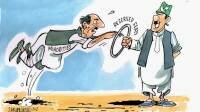The coming general elections are going to be another instance in which the Muslim majority leadership of the mainstream political parties will decide the fate of non-Muslim minority, instead of the 2.78 million registered voters from minorities.
According to the official data of the Election Commission of Pakistan (ECP), all the religious minorities constitute 2.78 million registered voters in Pakistan. Of them, 1.4 million are Hindus, followed by 1.24 million Christians, 115,966 Ahmedis, 5,934 Sikhs, 3,650 Parsis, 1,452 Buddhists and 809 Jews.
According to our laws, the minorities can contest elections on general seats and can also vote for the Muslim candidates on general seats but they cannot vote for their own minority candidates, which are supposed to represent them in the assemblies. What really happens is that lawmakers representing them are nominated by mainstream majority political parties against reserved seats.
Though it has been announced at times by successive governments that religious minorities of Pakistan will be given dual voting rights, but no such right has yet been given. Ironically, during former dictator Ziaul Haq’s military regime, minorities could only vote to elect their own representatives, not any Muslim candidates.
Later, during Pervez Musharraf’s rule, they were given the right to vote for Muslim or non-Muslim candidates contesting on general seats, but their own seats on which members of religious minorities would represent respective communities in the assemblies, were made reserved seats, just like the reserved seats for women.
Under the existing system, out of a total of 342 seats in National Assembly, direct elections are held on 272 seats, the rest are reserved seats. Under this formula, the 272 seats are divided by the number of total seats reserved for minorities which are 10. Thus, any party winning 27.2 general seats will get one minority seat. These seats are allocated to the parties in accordance with their priority list submitted to the ECP. Hence, minorities vote for general seats but their own representatives do not contest elections. So, on a party’s winning a certain number of seats, minorities’ representative get into politics after being nominated by the political parties.
This means, one part of the democratic assemblies comprises of people’s representatives that are elected directly while the other part comprises of reserved seats for women and minorities who are not elected directly by the public but are rather selected by the Muslim majority leadership of the mainstream political parties.
“When anyone from religious minorities gets nominated by a political party and then come into the assemblies, they work for their party not for the minorities, as they are not elected on their votes,” comments Pervaiz Masseh, a member of Young Christian Association, Karachi.
The element of corruption is also a factor in the existing system of selection. Anyone who wants to ensure their entry into the assemblies pays huge amount of money to the party leadership to get their name selected on the party’s priority list for reserved seats. It happened in the last government with Hindu assembly members when each of the four Hindu members, out of a total of nine reserved seats for minorities in Sindh Assembly, paid Rs20 million to Rs40 million to the PPP in the name of party funds.
“Yes, I paid Rs40 million to the provincial leadership of the PPP, but this amount had nothing to do with my selection; it was for the party fund,” admitted Mukesh Kumar Chawla, former Minister for Excise and Taxation, Sindh.
Due to this twisted system, these minority candidates after being selected by the parties do not work for the welfare of their communities. The basic issues faced by the Hindus, which is the biggest religious minority of the country, such as forced conversions, kidnappings for ransom, marriage act, family laws, lack of development schemes and jobs in public sector, have always remained unsolved issues.
Same happened with the Christians who are facing insecurity, blasphemy charges and other issues. “There is no true representation of minorities in the assemblies. Party tickets are being sold for specific amounts in the name of party funds. After getting elected they (MNAs, MPAs) mainly focus on getting licences for wine-shops, contracts and other benefits,” alleged Arjun Das, a social activist from Sukkur, Sindh.
Like Indian Hindus, Pakistani Hindus are also divided into caste system – the billionaire upper caste Hindus, and the poor lower caste, or untouchables, or as they are officially declared, Scheduled Castes, which is around 92 percent of the Pakistani Hindus. Most of these lower caste Hindus are landless peasants and living below the poverty line.
In the 2008-2013 assemblies, including the National Assembly and four provincial assemblies, there were 33 reserved seats (ten in the National Assembly, nine in Sindh, eight in Punjab and three each in KP and Balochistan assemblies) for minorities. Out of these 33 seats, Hindus being the biggest minority got 19 seats, and from among these 19 seats 18 were given to businessmen upper caste Hindus by various political parties.
The minorities’ leaders fear that like general elections in 2008, mainstream political parties will again ignore the real representatives of the minorities and bring influential and billionaires into the assemblies. “Despite repeated promises of the successive governments and political parties that they would give dual voting rights to minorities, no-one took any concrete step in this regard,” laments P M Dileep Advocate, a human rights lawyer from Karachi. He said that under the constitution of Pakistan, only Muslims of Kashmir have dual voting rights under which they can cast votes for their Azad Kashmir Legislative Assembly as well as in the general elections in Pakistan.
However, General Secretary, Pakistan Peoples Party (PPP), Sindh, Taj Haider, rejects such allegations. “PPP is the only party which has awarded party tickets to members of religious minorities on general seats and above all we do not consider them as minorities, they are Pakistanis like Muslims and we never nominated members for reserved seats against funds and bribes,” he said.
On the other hand, the representatives of minorities reject his claims. “It is not true that they (Muslim leadership of the political parties) think we are only Pakistanis? If that were the case, why do we have reserved seats in the assemblies? Why are these parties not awarding us tickets on general seats in those constituencies where we have considerable presence?” argued Dr Gotam, Pakistan Hindu Sabha Secretary General.
If for a while, Dr Gotam’s demand is accepted, there are reasons for political parties to award party tickets to religious minorities, especially in Sindh where non-Muslim voters have considerable presence in 13 districts. In these areas, Hindu voters can play important role in more than 86 constituencies of national and provincial assembly seats.
“There must not be reserved seats. We demand for some special seats for minorities, which should be made conditional on direct elections,” suggested Sardar Ramesh Singh, Chairman Pakistan Sikh Council.
Minorities also demand an increase in number of their seats in the assemblies. Recently, the PPP government announced to increase the number of seats for minorities, which represent 4.5 percent of the country’s total population of 180 million, from 33 to around 53, out of which 16 seats are in the NA, 12 in the Punjab Assembly, 13 in the Sindh Assembly and six each in the Khyber-Pakhtunkhwa and Balochistan assemblies. But these announcements have not yet translated into reality.
The writer is a journalist based in Karachi. He can be reached at [email protected]






















